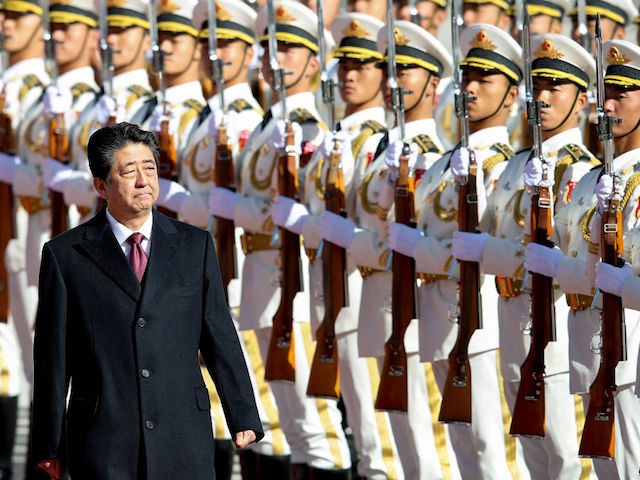A Japanese government official told the nation’s Kyodo News that Prime Minister Shinzo Abe brought up the subject of internment camps for Uighur Muslims in China during his ongoing visit to Beijing on Friday.
A BBC report published this week estimated that China has constructed at least 44 internment camps for Uighur Muslims in its westernmost province, Xinjiang, where the majority live. While reports detail indoctrination, forced learning of Mandarin, forced apostasy, and torture, the Chinese government insists the camps are “vocational centers” to make Uighurs more employable.
If the Kyodo report is accurate, Abe is the highest-ranking official in the world known to have personally challenged Beijing on the existence of the camps. Most Muslim nations, which have deep financial ties to China, have remained silent in the face of alleged human rights abuses against fellow Muslims. A notable exception is Pakistan, whose Federal Minister Pir Noorul Haq Qadri reportedly told a Chinese government counterpart his nation wished to see greater acceptance of Islam on Beijing’s part in September. Far from being a Muslim-majority nation, Japan is estimated to be home to a little less than 200,000 Muslims, or about 0.1 percent of the population.
Kyodo did not name the “Japanese official” who briefed reporters on the conversation allegedly taking place between Chinese Premier Li Keqiang and Abe on Friday. It did quote the official as saying, however, that Abe told Li that “the international community including Japan has been paying close attention to the human rights situation in China.” The report noted only that Abe reportedly expressed concern without elaborating.
Communist Party leader Xi Jinping began cracking down on the open practice of Islam in Xinjiang in 2014, citing religious extremism. Xinjiang is home to an Islamist separatist group known as the East Turkestan Islamic Movement (ETIM) and Beijing claims thousands of Uighurs joined the Islamic State in Syria and Iraq. More recently, however, reports of arbitrary detentions of Uighurs throughout the province began surfacing, eventually revealing the existence of camps where China is allegedly feeding Muslims pork and forcing them to memorize communist propaganda songs and abandon the Uighur language.
The camps are now believed to hold at least one million people and China has formally legalized their existence. Chinese propaganda outlets refer to the camps as “vocational centers” promoting “interfaith harmony” and claim reports of human rights violations against Uighurs, based largely on the testimony of those who have been in the camps and freed, is the product of “radical Western politicians” seeking to defame China.
Japan has billed Abe’s visit to China as mainly a financial endeavor, intended to improve trade ties between the two historically adverse nations. Abe met with Xi Jinping following his conversation with Li, where the two reportedly agreed to improve their strained ties.
“We (Japan) would like to join hands with China in contributing to peace and stability in the world,” Abe reportedly told Xi, according to Japan’s Mainichi Shimbun. “We confirmed that we are cooperative partners and absolutely do not pose a threat to each other.”
Xi reportedly replied that he was pleased Japan-China relations “have been put on back on the right track.”
“As the international situation changes, China and Japan are becoming increasingly dependent on one another. Our countries also have a growing number of common interests and concerns on a multilateral level,” Xi added, according to Japan’s NHK. “The rapid changes in the world are providing China and Japan with opportunities for more in-depth cooperation.”
The two did not reportedly provide the press any details on specific agreements to improve relations. Japanese officials did say that Xi was “seriously consider[ing]” an invite to Tokyo Abe offered him.
At press time, the only coverage of Abe and Xi’s meeting in Chinese state media is a series of photos of the pair on Xinhua with little context. The Global Times government newspaper, however, described the government as “optimistic” that the two governments could improve trade ties.
“Will China and Japan use this round of improvement in bilateral ties as a new starting point to establish an irreversible trend of boosting their collaboration?” the Times asked. “For now, it is hard to tell. But such a possibility exists and it is worthwhile for the two sides to jointly strive for it.”
“[W]e are optimistic about the momentum of improvement in Sino-Japanese relations. We believe that efforts to end the diplomatic wrangling and achieve win-win cooperation should be an attainable strategic adjustment for both sides,” the Times concluded.

COMMENTS
Please let us know if you're having issues with commenting.